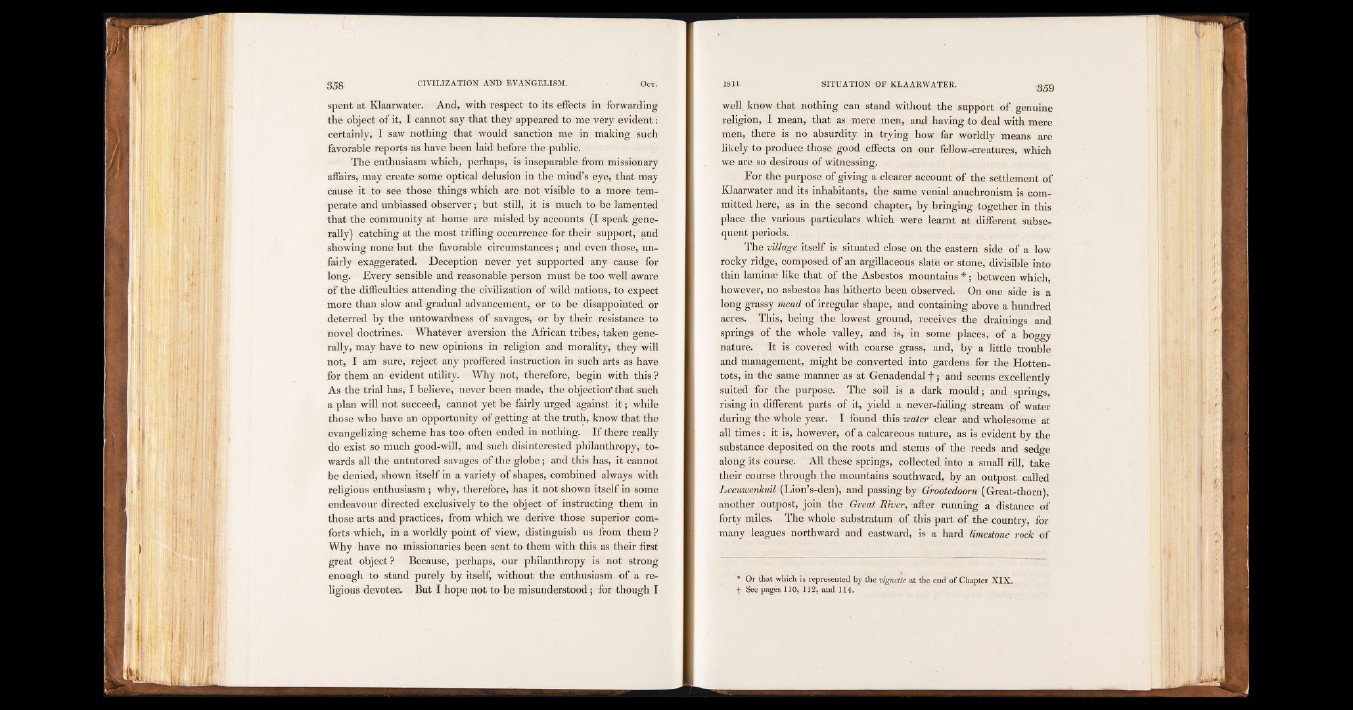
spent at Klaarwater. And, with respect to its effects in forwarding
the object of it, I cannot say that they appeared to me very evident:
certainly, I saw nothing that would sanction me in making such
favorable reports as have been laid before the public.
The enthusiasm which, perhaps, is inseparable from missionary
affairs, may create some optical delusion in the mind’s eye, that may
cause it to see those things which are not visible to a more temperate
and unbiassed observer; but still, it is much to be lamented
that the community at home are misled by accounts (I speak generally)
catching at the most trifling occurrence for their support, and
showing none but the favorable circumstances j and even those, unfairly
exaggerated. Deception never yet supported any cause for
long. Every sensible and reasonable person must be too well aware
of the difficulties attending the civilization of wild nations, to expect
more than slow and gradual advancement, or to be disappointed or
deterred by the untowardness of savages, or by their resistance to
novel doctrines. Whatever aversion the African tribes, taken generally,
may have to new opinions in religion and morality, they will
not, I am sure, reject any proffered instruction in such arts as have
for them an evident utility. Why not, therefore, begin with this ?
As the trial has, I believe, never been made, the objection'that such
a plan will not succeed, cannot yet be fairly urged against i t ; while
those who have an opportunity of getting at the truth, know that the
evangelizing scheme has too often ended in nothing. If there really
do exist so much good-will, and such disinterested philanthropy, towards
all the untutored savages of the globe; and this has, it cannot
be denied, shown itself in a variety of shapes, combined always with
religious enthusiasm; why, therefore, has it not shown itself in some
endeavour directed exclusively to the object of instructing them in
those arts and practices, from which we derive those superior comforts
which, in a worldly point of view, distinguish us from them ?
Why have no missionaries been sent to them with this as their first
great object? Because, perhaps, our philanthropy is not strong
enough to stand purely by itself, without the enthusiasm of a religious
devotee. But I hope not to be misunderstood; for though I
well know that nothing can stand without the support of genuine
religion, I mean, that as mere men, and having to deal with mere
men, there is no absurdity in trying how far worldly means are
likely to produce those good effects on our fellow-creatures, which
we are so desirous of witnessing.
For the purpose of giving a clearer account of the settlement of
Klaarwater and its inhabitants, the same venial anachronism is committed
here, as in the second chapter, by bringing together in this
place the various particulars which were learnt at different subsequent
periods.
The village itself is situated close on the eastern side of a low
rocky ridge, composed of an argillaceous slate or stone, divisible into
thin laminas like that of the Asbestos mountains *; between which,
however, no asbestos has hitherto been observed. On one side is a
long grassy mead of irregular shape, and containing above a hundred
acres. This, being the lowest ground, receives the drainings and
springs of the whole valley, and is, in some places, of a boggy
nature. It is covered with coarse grass, and, by a little trouble
and management, might be converted into gardens for the Hottentots,
in the same manner as at Genadendal f ; and seems excellently
suited for the purpose. The soil is a dark mould; and springs,
rising in different parts of it, yield a never-failing stream of water
during the whole year. I found this water clear and wholesome at
all times : it is, however, of a calcareous nature, as is evident by the
substance deposited on the roots and stems of the reeds and sedge
along its course. All these springs, collected into a small rill, take
their couTse through the mountains southward, by an outpost called
Leeuwenkuil (Lion’s-den), and passing by Grootedoorn (Great-thorn),
another outpost, join the Great River, after running a distance of
forty miles. The whole substratum of this part of the country, for
many leagues northward and eastward, is a hard limestone rock of
* Or that which is represented by the vignette at the end of Chapter XIX.
f See pages 110, 112, and 114.